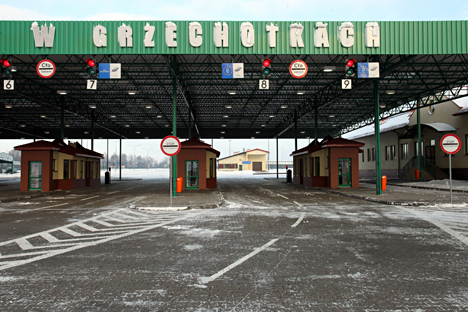
Mamonovo-2 border-crossing station for freight-and-passenger vehicles in the Kaliningrad Region on the border between the Russia and Poland.
Eduard Molchanov/TASSTurkey has joined Poland in closing its borders to Russian motor freight traffic on Feb. 1, saying that the limits proposed for operating in Russia by the Russian side were too narrow.
According to the Association of International Road Transport Carriers (ASMAP), the situation with Turkey is linked to the current political situation and the sanctions imposed on Ankara by Russia over the downing of a Russian fighter jet by the Turkish air force on the Syrian border on Nov. 24, 2015, while the Poles have closed their borders to Russian truckers in protest over changes to Russian legislation on road transportation.
"Due to the expiration of the 2015 Turkish permits on Jan. 31, 2016, we recall that transportation through Turkey by Russian transport is impossible," ASMAP said in a statement.
"At present, the Russian Ministry of Transport is taking measures to resolve the issue – proposals for the exchange of permits have been re-sent to the Turkish side."
"Now, the quantity of products imported from Turkey has declined, but there remain unrestricted goods, and part of the traffic remains interesting for the Russians.
"As a result, these hitches have already led to problems – for example, spare parts which were being waited for in St. Petersburg failed to make it there," the organization said.
In turn, Yevgeny Moskvichev, the chairman of Russia’s Duma Committee on Transport, said that an agreement between the countries on the number of permits had been reached and the Russian proposal would soon be considered by the Turkish side.
"There are recurring problems with Turkey," said a source in the ASMAP.
"Of course, all countries protect their markets and want to get as many orders for the transportation of cargoes as possible. But they tried to take full loads and do all the work with their own trucks, and only afterward could we get in line for orders. The result was such that it was mostly their carriers that worked in Turkey, while ours received much fewer orders. Only recently, the number of our carriers has increased to 40 percent.
"Now the ferries do not go via Turkey. The shippers themselves do not want to send goods through Ukraine. As a result, we went through Poland in December and January, but now it is closed too.
"Turkey has decided to fight for its demands at the political level. So far, shippers and consignees have to come up with alternative delivery options."
According to the source, Russia used the Turkish route primarily to carry goods to Iran, while receiving vegetables, fruit, paint and parts for its Renault plant and other enterprises.
In turn, Nadezhda Podkorytova, the head of the legal department at broker Alor, noted that such developments had been widely anticipated, so Russian companies could have prepared for the possibility that the permits might not be renewed.
“There are no violations from the standpoint of international law, because both Turkey and Russia have the right to determine the number of permits issued to transport companies, or to make decisions not to issue them at all," said Podkorytova.
Against the background of the negotiations with Turkey, the question of Russia's relations with Poland becomes even more acute.
Warsaw has closed the road to Russian haulers into its territory in protest at changes in Russian legislation that significantly increase responsibility for violations of international motor transportation.
In response Poland has demanded the lowering of fines and an increase in quotas for its truckers on Russian territory. Negotiations are currently underway between the two countries on the resumption of freight transportation.
First published in Russian in Gazeta.ru
All rights reserved by Rossiyskaya Gazeta.
Subscribe
to our newsletter!
Get the week's best stories straight to your inbox